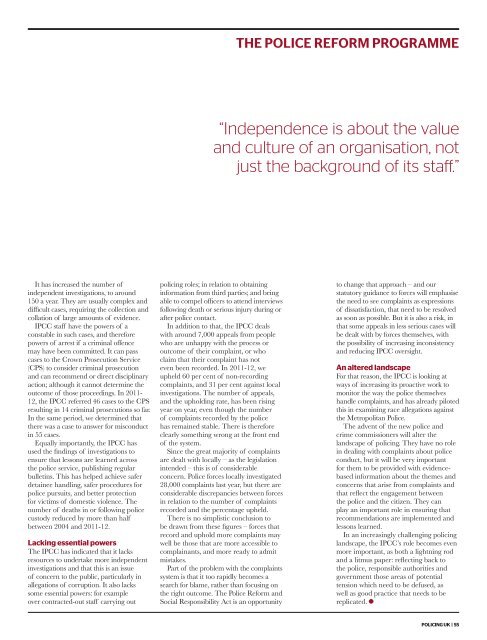Policing UK 2013 - Police Federation
Policing UK 2013 - Police Federation
Policing UK 2013 - Police Federation
Create successful ePaper yourself
Turn your PDF publications into a flip-book with our unique Google optimized e-Paper software.
THE POLICE REFORM PROGRAMME<br />
“Independence is about the value<br />
and culture of an organisation, not<br />
just the background of its staff.”<br />
It has increased the number of<br />
independent investigations, to around<br />
150 a year. They are usually complex and<br />
difficult cases, requiring the collection and<br />
collation of large amounts of evidence.<br />
IPCC staff have the powers of a<br />
constable in such cases, and therefore<br />
powers of arrest if a criminal offence<br />
may have been committed. It can pass<br />
cases to the Crown Prosecution Service<br />
(CPS) to consider criminal prosecution<br />
and can recommend or direct disciplinary<br />
action; although it cannot determine the<br />
outcome of those proceedings. In 2011-<br />
12, the IPCC referred 46 cases to the CPS<br />
resulting in 14 criminal prosecutions so far.<br />
In the same period, we determined that<br />
there was a case to answer for misconduct<br />
in 55 cases.<br />
Equally importantly, the IPCC has<br />
used the findings of investigations to<br />
ensure that lessons are learned across<br />
the police service, publishing regular<br />
bulletins. This has helped achieve safer<br />
detainee handling, safer procedures for<br />
police pursuits, and better protection<br />
for victims of domestic violence. The<br />
number of deaths in or following police<br />
custody reduced by more than half<br />
between 2004 and 2011-12.<br />
Lacking essential powers<br />
The IPCC has indicated that it lacks<br />
resources to undertake more independent<br />
investigations and that this is an issue<br />
of concern to the public, particularly in<br />
allegations of corruption. It also lacks<br />
some essential powers: for example<br />
over contracted-out staff carrying out<br />
policing roles; in relation to obtaining<br />
information from third parties; and being<br />
able to compel officers to attend interviews<br />
following death or serious injury during or<br />
after police contact.<br />
In addition to that, the IPCC deals<br />
with around 7,000 appeals from people<br />
who are unhappy with the process or<br />
outcome of their complaint, or who<br />
claim that their complaint has not<br />
even been recorded. In 2011-12, we<br />
upheld 60 per cent of non-recording<br />
complaints, and 31 per cent against local<br />
investigations. The number of appeals,<br />
and the upholding rate, has been rising<br />
year on year, even though the number<br />
of complaints recorded by the police<br />
has remained stable. There is therefore<br />
clearly something wrong at the front end<br />
of the system.<br />
Since the great majority of complaints<br />
are dealt with locally – as the legislation<br />
intended – this is of considerable<br />
concern. <strong>Police</strong> forces locally investigated<br />
28,000 complaints last year, but there are<br />
considerable discrepancies between forces<br />
in relation to the number of complaints<br />
recorded and the percentage upheld.<br />
There is no simplistic conclusion to<br />
be drawn from these figures – forces that<br />
record and uphold more complaints may<br />
well be those that are more accessible to<br />
complainants, and more ready to admit<br />
mistakes.<br />
Part of the problem with the complaints<br />
system is that it too rapidly becomes a<br />
search for blame, rather than focusing on<br />
the right outcome. The <strong>Police</strong> Reform and<br />
Social Responsibility Act is an opportunity<br />
to change that approach – and our<br />
statutory guidance to forces will emphasise<br />
the need to see complaints as expressions<br />
of dissatisfaction, that need to be resolved<br />
as soon as possible. But it is also a risk, in<br />
that some appeals in less serious cases will<br />
be dealt with by forces themselves, with<br />
the possibility of increasing inconsistency<br />
and reducing IPCC oversight.<br />
An altered landscape<br />
For that reason, the IPCC is looking at<br />
ways of increasing its proactive work to<br />
monitor the way the police themselves<br />
handle complaints, and has already piloted<br />
this in examining race allegations against<br />
the Metropolitan <strong>Police</strong>.<br />
The advent of the new police and<br />
crime commissioners will alter the<br />
landscape of policing. They have no role<br />
in dealing with complaints about police<br />
conduct, but it will be very important<br />
for them to be provided with evidencebased<br />
information about the themes and<br />
concerns that arise from complaints and<br />
that reflect the engagement between<br />
the police and the citizen. They can<br />
play an important role in ensuring that<br />
recommendations are implemented and<br />
lessons learned.<br />
In an increasingly challenging policing<br />
landscape, the IPCC’s role becomes even<br />
more important, as both a lightning rod<br />
and a litmus paper reflecting back to<br />
the police, responsible authorities and<br />
government those areas of potential<br />
tension which need to be defused, as<br />
well as good practice that needs to be<br />
replicated.<br />
POLICING <strong>UK</strong> | 55
















